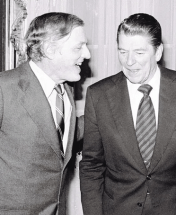
In welcome contrast to his predecessor, Pope Leo XIV has so far kept a rather low profile, refraining from comments on quotidian issues.
However, His Holiness has recently delivered himself of a statement I find puzzling:
“Someone who says, ‘I’m against abortion, but I am in favour of the death penalty,’ is not really pro-life. Someone who says, “I’m against abortion, but I’m in agreement with the inhuman treatment of immigrants in the United States,’ I don’t know if that’s pro-life.”
Let’s see if I can decipher this message, and if I can’t I’ll appreciate all the help I can get.
Starting from the end, the Pope seems to believe that immigrants to the United States are treated inhumanly, which denies their right to life. The statement is so earth-shattering that I for one would like to see some supporting evidence.
To begin with, I can testify from the personal experience of someone who arrived in the US as an immigrant 52 years ago, that no inhuman – nor indeed inhumane – treatment was anywhere in evidence. Granted, unlike illegal arrivals in today’s Britain, I wasn’t put up at a four-star hotel. All I got was a Broadway fleabag with a carpet of cockroaches that made a crunching sound whenever I got out of bed.
Still, I didn’t suffer from any encroachment on my essential rights. Quite the contrary, for the first time in my life I found myself in a country where my essential rights were recognised and upheld.
I don’t know whether that situation has changed in the intervening half century, but, even if it has, I’m convinced that new arrivals aren’t slaughtered en masse. If they aren’t, then I can’t see how their treatment violates their right to life.
From where I sit, the US government is indeed trying to limit the right of illegal immigrants to life in the US, but that’s hardly the same thing. Unless, of course, His Holiness can demonstrate, facts in hand, that all those huddled Mexican masses legitimately fear for their lives in their native land.
Barring such proof, let’s charitably put the tail end of the Pope’s statement down to a rhetorical flourish that amounts to little more than a non sequitur. However, the rest of what he said deserves closer examination.
His Holiness clearly finds opposition to abortion incompatible with support for the death penalty. Someone who combines both beliefs is thus disingenuous if he insists he is pro-life. Decide, my son, he seems to be saying to me, if you are against abortion or in favour of the death penalty. You can’t be both.
I’m afraid I disagree, with every requisite deference.
We have to assume that the head of the Roman Catholic Church is anti-abortion. If we can’t make that assumption, we might as well pack up and go home. That would be worse than believing that the Metropolitan Police Commissioner sees no need for law enforcement, although at times one can be forgiven for getting that impression.
Logically then, His Holiness thinks that both abortion and the death penalty constitute the denial of the right to life, which makes them wrong. Any Christian, actually anyone capable of logical thought, will agree that abortion discontinues a human life without due process, which violates that sacred right.
However, an argument can be made that the death penalty actually asserts the value of a human life, rather than denying it.
By sentencing a murderer to death, society sends a message orbi et urbi that the wanton taking of a life is a crime so heinous that it can’t be offset by any length of imprisonment. Only the death penalty is a punishment truly commensurate with the crime.
Neither a theological nor historical argument against the death penalty cuts much ice. Yes, the Church has always taught that the taking of a human life is wrong. However, it may be righteous if it prevents wrongs that are even worse.
Logic and any understanding of human nature suggest that the death penalty has deterrent value: any sane person would risk prison more readily than the chair. Any murder statistics in states or countries practising capital punishment are a priori meaningless. While irrefutably showing the number of murders the death penalty didn’t deter, they give no inkling as to the number of murders it did deter.
While no statistics are available on the number of lives taken by recidivist murderers who’ve served their sentence and then killed again since the death penalty was abolished in Britain, it’s generally believed that number runs into hundreds, possibly thousands. Any number greater than one proves the positive net effect of the death penalty, and any newspaper reader will agree it’s much greater than one.
But deterrence apart, since at least the time of St Augustine of Hippo, the Church has recognised the doctrine of just war. Since any war, just or unjust, presupposes killing, no Christian prelate can argue persuasively that any killing is ipso facto abhorrent.
Most theologians believe the commandment “Thou shalt not kill” means “Thou shalt not murder”. This leaves room for capital punishment, with the state acting as a divine agent. (As Burke wrote in his Reflections, “He who gave our nature to be perfected by our virtue, willed also the necessary means of its perfection. He willed therefore the State”.)
This view is supported by the distinction between the Hebrew words for lawful killing and murder, as well as by Scriptural accounts legitimising lethal force used in self-defence, warfare and under divine law.
To use the expression borrowed from His Holiness’s native variant of the English language, any unequivocal statement on capital punishment invariably opens a can of worms. These invertebrates crawl out and curl around logical and theological inconsistencies.
This isn’t to say that no opposition to the death penalty can ever be sound. One could, for example, cite the corrupting effect it has on the executioner, or else doubt the right of mortal and therefore fallible men to pass irreversible judgement.
Such arguments are noble, but they aren’t modern arguments. For it’s not just the death penalty that the modern lot are uncomfortable with, but the very idea of punishment as such.
More and more, they betray their Enlightenment genealogy by insisting that people are all innately good and, if some behave badly, they must be victims of correctable social injustice. More and more, one detects a belief that justice is an antiquated notion, and law ought to be only an aspect of the social services.
Far be it from me to suspect His Holiness of holding such essentially irreligious views. One can only wish he recognised that the issue of capital punishment has to be discussed in a broad secular and theological context. It can’t be resolved with a simple yes or no statement.
Good job then that the Pope wasn’t speaking ex cathedra, and infallibility doesn’t apply.








